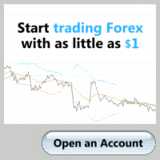Do you think of anything when I say the phrase, "Japanese candlesticks?" In fact, this has a lot to do with trading in foreign exchange.
Candle charts (also called "Japanese candlesticks") were originally created in Japan several centuries ago so that rice could be traded. Today, thousands of traders use the same charting "system" to track price movement.
Many people find that candle charts are easier to read than standard bar charts are, and therefore, they have become very popular. In fact, most Forex charts you see are in the format of Japanese candlesticks.
Candle charts are made up from the opening and closing prices, as well as high and low prices.
If a price opens lower than it closes (in other words rises during trading), a hollow candle is drawn on the chart (usually in white or green).
If a price opens higher than it closes (in other words falls during trading) a filled candle is drawn, usually in red or black in color.
Many online brokers today used the red and green color scheme rather than the white and black color scheme. Trends can be easily seen even by newcomers this way, because green candles signify price increases while red candles indicate that price has decreased.
It's not just designed this way for "newbies", either. Any trader, regardless of experience or skill, needs to be able to have a clear visual system of evaluating data. It's essential to his or her decision making process.
However, moving on from the "history" of Japanese Candlesticks and how they relate to Forex trading - let's evaluate why they're significant.
It's simple: The significance is that they represent our ability to bring simplicity to complex transactions without losing accuracy.
Whether the context is trading rice in the 14th century or trading the Euro/USD currency pair in 2008 from your high-speed connection, the fact remains that you don't have to be an expert to understand and profit from complex markets.
The tools you need to succeed have already been developed. All you have to do is practice using them, and you'll quickly be able to see how what would normally be complex can - through practice and experience - become as simple as any other basic task.
The only question is this: Are you willing to put in the time until it becomes simple?
Ancient rice traders depended on tools like this for their livelihood.
There's no reason why you can't either. And it could end up being a whole lot more valuable than, say, rice.
Candle charts (also called "Japanese candlesticks") were originally created in Japan several centuries ago so that rice could be traded. Today, thousands of traders use the same charting "system" to track price movement.
Many people find that candle charts are easier to read than standard bar charts are, and therefore, they have become very popular. In fact, most Forex charts you see are in the format of Japanese candlesticks.
Candle charts are made up from the opening and closing prices, as well as high and low prices.
If a price opens lower than it closes (in other words rises during trading), a hollow candle is drawn on the chart (usually in white or green).
If a price opens higher than it closes (in other words falls during trading) a filled candle is drawn, usually in red or black in color.
Many online brokers today used the red and green color scheme rather than the white and black color scheme. Trends can be easily seen even by newcomers this way, because green candles signify price increases while red candles indicate that price has decreased.
It's not just designed this way for "newbies", either. Any trader, regardless of experience or skill, needs to be able to have a clear visual system of evaluating data. It's essential to his or her decision making process.
However, moving on from the "history" of Japanese Candlesticks and how they relate to Forex trading - let's evaluate why they're significant.
It's simple: The significance is that they represent our ability to bring simplicity to complex transactions without losing accuracy.
Whether the context is trading rice in the 14th century or trading the Euro/USD currency pair in 2008 from your high-speed connection, the fact remains that you don't have to be an expert to understand and profit from complex markets.
The tools you need to succeed have already been developed. All you have to do is practice using them, and you'll quickly be able to see how what would normally be complex can - through practice and experience - become as simple as any other basic task.
The only question is this: Are you willing to put in the time until it becomes simple?
Ancient rice traders depended on tools like this for their livelihood.
There's no reason why you can't either. And it could end up being a whole lot more valuable than, say, rice.


